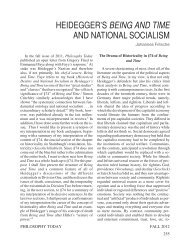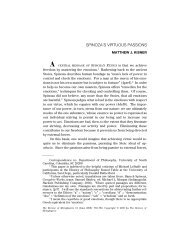The Essay as Self-Knowledge: Montaigne's Philosophical ...
The Essay as Self-Knowledge: Montaigne's Philosophical ...
The Essay as Self-Knowledge: Montaigne's Philosophical ...
You also want an ePaper? Increase the reach of your titles
YUMPU automatically turns print PDFs into web optimized ePapers that Google loves.
70 ANN HARTLE<br />
Froissart, “who presents to us even the diversity of the rumors that<br />
were current and the different reports that were made to him. This is<br />
the material of history, naked and unformed” (VS417; F304). And he<br />
says of all good historians that “they keep a record of important events;<br />
among public incidents are also popular rumors and opinions. It is<br />
their part to relate common beliefs, not to regulate them. That part<br />
concerns the theologians and philosophers, directors of consciences”<br />
(VS942; F720). So, although Tacitus w<strong>as</strong> writing at a time when the<br />
belief in prodigies had begun to wane, “he says he does not want for<br />
all that to fail to insert them in his Annals, and give a footing to things<br />
accepted by so many good people with such reverence for antiquity.<br />
That is very well said. Let them deliver history to us more <strong>as</strong> they<br />
receive it than <strong>as</strong> they see fit” (VS943; F720). For Montaigne, the very<br />
fact that something is accepted by many good people h<strong>as</strong> some weight<br />
and cannot be simply dismissed. That something is or h<strong>as</strong> been believed<br />
reveals the nature of the human capacity for belief.<br />
Although Montaigne refuses to simply dismiss reports of fant<strong>as</strong>tic<br />
occurrences, he does not e<strong>as</strong>ily believe them, either. This is especially<br />
true with respect to accusations of sorcery. “To kill men, we<br />
should have sharp and luminous evidence; and our life is too real<br />
and essential to vouch for these supernatural and fant<strong>as</strong>tic accidents”<br />
(VS1031; F789). In the matter of such accusations, a man ought to<br />
be believed about what is human, but only God can authorize a supernatural<br />
effect. Someone is accused of being a sorcerer because<br />
witnesses say that one day he w<strong>as</strong> in the e<strong>as</strong>t, the next day in the<br />
west. “Truly, I would not believe my own self about this. How much<br />
more natural and likely it seems to me that two men are lying than<br />
that one man should p<strong>as</strong>s with the winds in twelve hours from the<br />
e<strong>as</strong>t to the west! How much more natural that our understanding<br />
should be carried away from its b<strong>as</strong>e by the volatility of our untracked<br />
mind than that one of us, in flesh and bone, should be wafted up a<br />
chimney on a broomstick by a strange spirit! . . . It seems to me that<br />
we may be pardoned for disbelieving a marvel, at le<strong>as</strong>t <strong>as</strong> long <strong>as</strong> we<br />
can turn <strong>as</strong>ide and avoid the supernatural explanation by non-marvelous<br />
means” (VS1032; F789).<br />
<strong>The</strong> distinction that he makes between physical powers (where it<br />
is e<strong>as</strong>ier to know our limits) and the possibilities of the human soul<br />
(where it is very difficult to <strong>as</strong>sign limits) is the distinction that allows<br />
him to defend Plutarch against the scepticism of Bodin, and it would

















